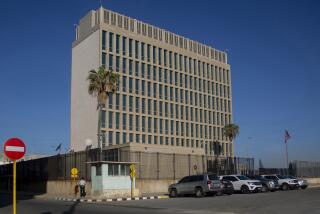Study Links Chemicals to Gulf War Illness
WASHINGTON â The elusive Gulf War syndrome was caused by combinations of usually harmless chemicals as they came into contact with U.S. troops during the 1991 Persian Gulf War, according to new research published in the Journal of the American Medical Assn.
The research, based on examination of 249 Navy construction battalion members, suggests that the mysterious complaints stemmed not from battlefield stress but from physical damage inflicted by exposure to low-level doses of nerve gas, pesticides, anti-nerve-gas medicine and other substances.
âIllness from the Gulf War is real,â declared Dr. Robert W. Haley of the University of Texas Southwestern Medical Center, who was chief investigator in the research. âThe syndromes are due to subtle brain, spinal cord and nerve damage--but not stress.â
The paper was another in a series of studies that have reached sharply different conclusions on a medical mystery that is also a matter of hot political dispute. Veterans groups, some of their allies in Congress and other critics maintain that the Pentagon has responded slowly and halfheartedly to the complaints of thousands of veterans.
On Tuesday, a 10-member panel of experts convened by the White House issued a report faulting the Pentagonâs handling of the issue but finding that nerve gas exposure was not likely to have caused the illnesses now under scrutiny.
Some researchers quickly cautioned that the Texas study offered valuable new data and theories but said that it had weaknesses in method that made it less than definitive. The sample was small, the illnesses were self-reported and the most intensive medical testing, using electronic instruments, was given to only five veterans, these researchers pointed out.
âThis is another brick in the wall, but it isnât definitive,â said Dr. Philip Landrigan, a researcher at Mt. Sinai School of Medicine in New York and a member of the presidentâs advisory committee.
Landrigan, who wrote an editorial giving his own point of view in the same issue of the medical journal, said at a press conference that the Texas studies âraise very serious and substantial questions of neurotoxic effects. But they donât pin it to the ground.â
The work by the Texas researchers was underwritten by Texas billionaire Ross Perot and was examined by other researchers before being published by the medical journal.
The study found that a quarter of the battalion members they examined suffered from symptoms that they grouped into three major âsyndromes.â
The researchers called one ailment the âimpaired cognitionâ syndrome. The symptoms included memory lapses, depression, insomnia, daytime fatigue, slurred speech, confusion and migraine-like headaches.
In this group were veterans who had worn flea collars in the Persian Gulf to ward off desert bugs.
A second syndrome had symptoms of confusion and disorientation, dizziness, sensations of lost balance, problems thinking and reasoning and sexual impotence. The researchers found this constellation of symptoms among veterans who had taken the medicine pyridostigmine bromide, or PB, to counter nerve gas, and also among those who had been subjected to Iraqi chemical weapons.
The researchers found a third syndrome associated with joint and muscle pain, muscle weakness and tingling in the limbs. Many of the studied veterans suffering from this ailment had apparently come in contact with heavy concentrations of a pesticide ingredient called DEET and also had taken the PB pills.
Landrigan said that the White House panel probably would not have changed its report very much had the University of Texas research been fully available earlier. The main elements of the Texas research were known, he pointed out.
The Pentagon has said that as many as 20,000 Gulf War veterans may have been exposed to nerve gas when U.S. engineers blew up an Iraqi weapons dump in the desert at Kamisiyah. But the problems reported in this study were unrelated to that, for the construction battalion was nowhere near that facility.
Other research has suggested that chemicals cited in the Texas study may cause damage when they are combined. Last spring, researchers at Duke University reported nerve damage in animals who had been exposed to combinations of pesticides and the anti-nerve-gas tablets provided to troops in the gulf.







